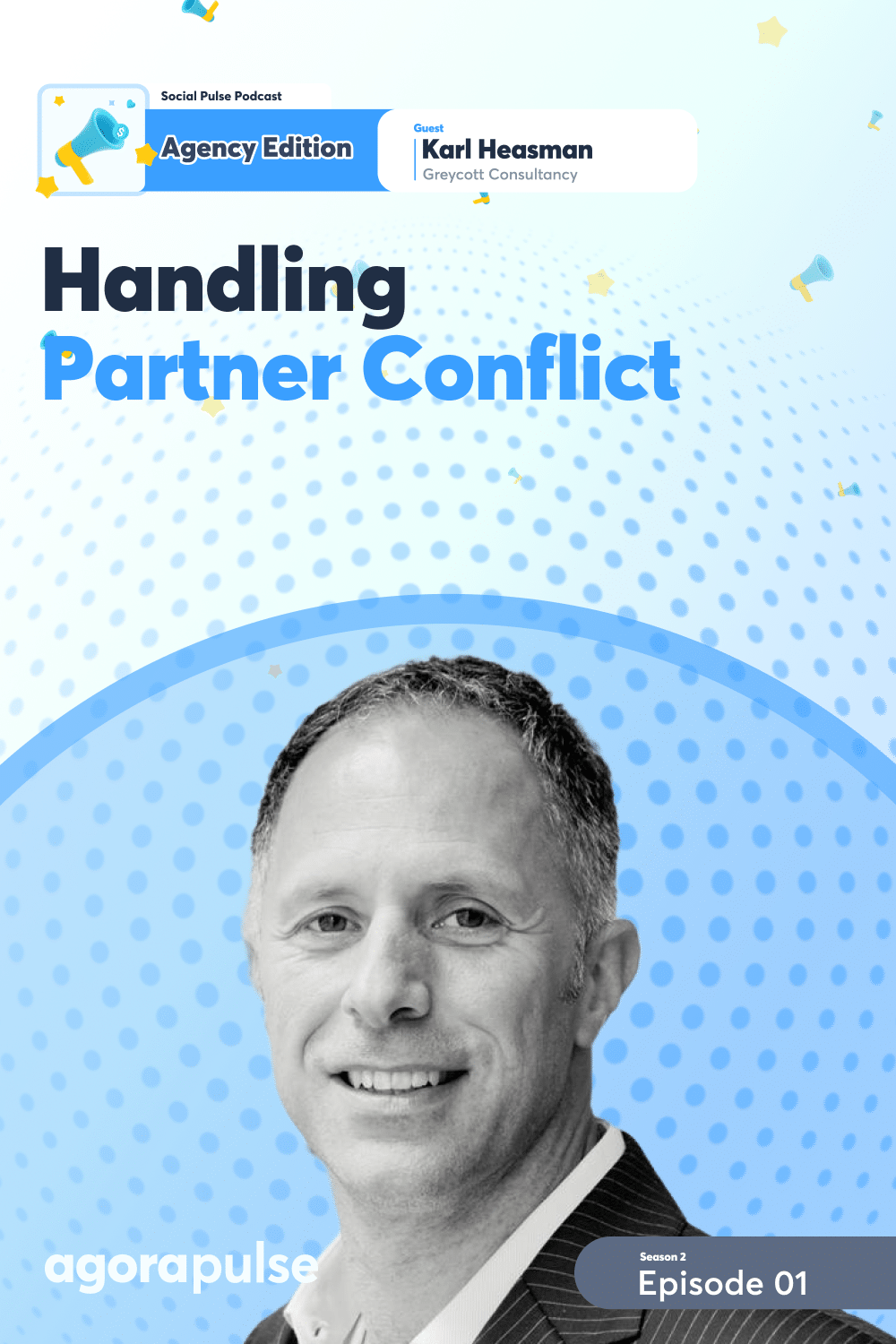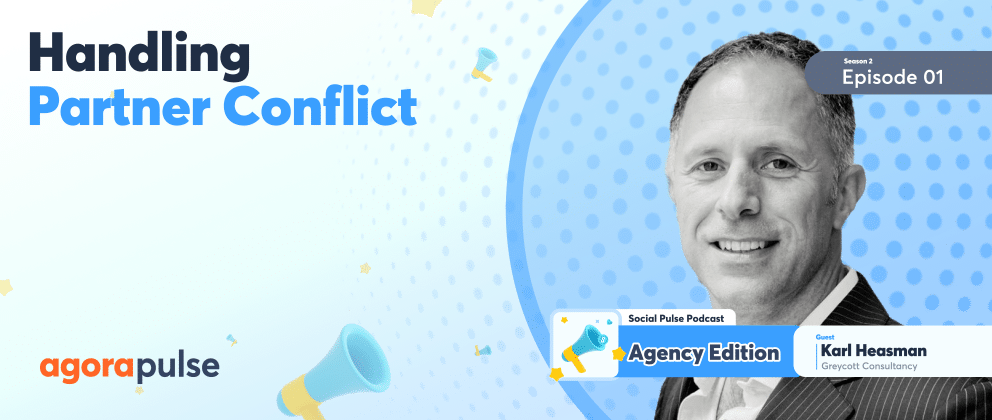When an agency owner wants to make an important decision on behalf of the agency, such as what services to offer, or even whether to sell the business, it’s their decision to make. But if you have one or more partners, now you have to reach a consensus. If you don’t have alignment among all partners, agreeing on anything will be hard and potentially detrimental to the success of the agency and the partners.
How can you identify these kinds of issues before they arise? And if you’re already in conflict with your partners, what should your next steps be?
That’s exactly what Karl Heisman is going to talk to us about in this episode of Social Pulse Podcast: Agency Edition hosted by Agorapulse chief storyteller, Mike Allton. Listen to the full podcast below or read on for the transcript.
Karl spent 25 years in the agency business and has since gone on to coach and mentor people dozens of other agency owners and partners going through challenging situations. He works with ambitious digital marketing and communications agencies, typically between 500,000 and 5 million in revenue, to help them achieve their goals. He’s an invaluable partner to help other agency owners tackle their growth challenges.
Getting Started with Partners
Mike Allton: Can you start by sharing a little bit of your own experience, thinking back to when you were an agency owner and how that partnership, with that co-founder/co-partner fared?
Karl Heasman: Yeah. Well, where do I begin? I guess I begin [with] when I decided I needed a partner, or a number two.
I was five years into my agency journey. The business had gotten to a point where I couldn’t manage it myself. I had probably three sorts of permalancer account handlers and maybe five freelance creatives, and I got to a point where I was running out of capacity. I needed to take on a full-time member of staff and decided that one option would be to bring in a number two. And I met somebody who I used to work with who had been a board director of a 150-person agency that I used to work with.
And he just finished an MBA and was out of work or looking for his next job. I had a freelance opportunity to pitch for a beer brand, and he had the skills that I needed for that particular pitch. I reached out to him, and we worked together on the pitch. And we won the pitch off a big hundred-person agency and suddenly thought, “Wow, I need to scale.” He had the right skills at the time to help me with that one particular client.
So, that was the inspiration for us getting together. And that was five years in. The first year I thought was going to be just doubling the business because he had a similar background to me. We’re both from a client service account handling background, and I thought all I needed was another person like me to double the agency size.
It transpired that the beer brand that we won a loyalty program from and the loyalty program didn’t actually materialize. And that was the reason why I brought him in the first place. So I didn’t get the growth that I hoped for. But so the first year, I think we flat-lined on the same income.
But I started seeing the benefits of having a number two who had complementary skills. We started to grow the business, and we are currently organizing the business, having board meetings monthly, deciding where we were going to go, having a growth plan, and for the next five years, the business almost doubled every year for the five years. It wasn’t until the 10th anniversary that I decided that I wanted a change that we started to have a few conflicts, and we were misaligned on our final direction or destination.
Challenges with Partners
Why is it that it’s such a challenge, first of all, for a couple of people to be working in the same business after many years?
Mike Allton: I mean, your story is a little bit unique. I imagine a lot of agency partners and co-owners—they’re co-founders, right? They started that agency together. You brought somebody on as a partner halfway through, but why is it such a challenge to come up with that alignment? And why do you think that is? And more importantly, why is it so important to be in alignment?
Karl Heasman: I guess it’s because you have rose-tinted glasses when you get together. You’ve gone through a honeymoon period because you see all the benefits and all the pros of getting together.
But I guess you don’t see or discuss the potential downside or problems or challenges until they come. And they may not come for four or six months, a year, or five years. I guess you don’t prepare in advance for that alignment. That’s something that happens by chance, I guess, that you discuss where you’re going with your partner, where the long distance is, what the goals are, what the final destination is. You might do that by chance at the beginning of that relationship, or you might just get on and do the work, which I think tends to happen.
You just jump in because it sounds like a great idea at the time without knowing where you’re going, where this is, and where that final destination is.
And, over time, of course, challenges come along, whether that’s financial challenges, or you don’t like the way they deal with staff members, or they deal with a client in a way that you wouldn’t like them to deal with, or something along the line changes.
And that’s when you start to think, “Yeah, are we misaligned? Where are we going? Do we need a marriage guidance counselor?”
Mike Allton: Right, right. So along those lines, I know that’s not the only thing that you do to help agencies, but you’ve obviously spoken to a lot of agencies who’ve been going through these kinds of struggles.
Examples of Agency Partnership Struggles
Karl Heasman: I’ve had probably a handful of agencies that had partner challenges.
They are a little bit of a taboo subject. Sometimes, people don’t tend to talk about them. It’s a bit like having challenges with your marriage. You don’t tend to talk about them openly with people. I think the same applies to agencies. But of course, because I’m in the inner circle, mentoring the owners, managing or chairing their board meetings, I can sense sometimes there’s a conflict, or I can see it. It might be more open and just sensing it. Or they might even tell me they’ve got a challenge, and can I help with it?
One particular agency I can think of had three partners, and one of those partners was a lady who had two babies within three years. And we were going through a rapid growth phase at that point. We were preparing for an exit to a big network agency. And in the four years, I think, or three and a half to four years I was working with them, one of the partners was absent on maternity leave for 18 months. And I think the other two partners started to build a bit of resentment for that. She wasn’t there to help. and they were doing more work.
So sometimes you get those challenges. And I think if it’s not discussed openly, then that can lead to resentment. I think in that particular instance, I had to facilitate some conversations, which enabled them to get through that challenging time. And fortunately, they stayed together as a [trio] and [made] a successful exit to a network agency.
Another agency I worked with again had three partners. One of them was not aligned with the other two when I was in my meetings with them. And we decided to conduct some personality tests. And that was enlightening because when we saw the results, I could see why there was, I sensed there was an issue between the three of them. Two of them were very much aligned, and the personality test suggested they would get on well. And the other one was different and had a different approach.
That exercise allowed us all to be a bit more objective about their relationships and how they work together. And it allowed us to discuss it in a way that took the sensitivity out of the mix and made it less personal. Because, of course, these conversations can get very personal, people can get very upset, and they can be very insulted that they think their character is being questioned.
So, in this case, we had the results of the personality test, and it became very clear one of the partners was not going to see things in the same way the other two were.
I think that gave us the catalyst to have a conversation about whether or not they should stay together. And I was able to—in that instance—facilitate the one who wasn’t in alignment to exit the business. And I facilitated those conversations. And it led to three becoming more amicable way [more] than if I wasn’t around, let’s say.
Mike Allton: That’s powerful, I think, to be able to take an aspect of the partnership such as personality and attach it from the individual people and examine it like it’s a problem to be solved or an opportunity to be leveraged, rather than like you said, a personal character defect, right? It’s not about me and who I am as a person.
It’s about, “This is how I come across. This is how I lead or how I exist as a partner. And how can we change or visualize or discuss that?” I think that’s outstanding.
Be aware of the warning signs
Now you’ve got some folks listening who in these kinds of arrangements with their agency, they’ve got one or more partners, but they’re not necessarily having any kind of conflict yet.
Are there any warning signs that they should be mindful of that [they] may be like, “What? This is something that we might want to talk about today before it becomes a problem.”
Karl Heasman: Yes, I think there are. There are some warning signs, and also there are some things you should do at the outset as well before you even look for those sites.
And, in that case, I think you probably should have a shareholders agreement, which allows you to put a lot of this information down on paper. At the beginning of the relationship, you can discuss, “How does one party leave if they want to leave, what is the mechanism for valuing their exit if they want to leave early?”
Those sorts of things are helpful.
In my situation, I also put drag-and-tag rules on my shares, which is a legal term. I’m not sure if that applies in American law as well, but what it basically means in England is that if you sell, the majority shareholder sells their shares. The drag-and-tag rules apply, and it means that you drag the other shareholders into the sale. They can’t stop you.
I think getting the shareholder agreement in place at the early part of that relationship is a useful exercise because you just start to discuss what the exit is, and what the end goal is, so you start with the end in mind rather than just talking about how exciting this is to start with something.
I would advise you to start thinking about where is this going to go? What does everyone’s journey look like? Is there a destination that we’re heading to? And do we all want to get off this journey at the same time? I mean, you don’t have to.
That’s the key.
You need to be going in the same direction, but everyone doesn’t have to get off the train at the same station.
I think that’s important to think about. But challenges over time that might create conflicts or warning signs are things like the first time you lose a client or the first time you lose a staff member, which feels quite personal when you first lose them, and you start questioning, “Was it me or was it them?” Or little things along the way. Those things will happen, and, of course, as you get longer in your agency journey, those things become quite normal.
But I think the first time they happen, that can rock you a little bit. Bigger things, life-changing things like having children can change the dynamics of the relationship. It might mean that one party isn’t around as much as less time they need to go home earlier. They have a child to mind. All those things can lead to a change of relationship, which could then lead to maybe one per party or one partner feeling that they’re adding more value than another.
And I think that’s key. That is a key trigger for resentment to build because, at the end of the day, every partner needs to and should feel that they’re adding the appropriate value to what to whatever their shareholding is.
Financial pressures are another one. I’m sure the last year or so has been testing a lot of relationships, particularly where perhaps the owners haven’t been able to pay themselves enough to cover all of their, expenses in a way that they would like, or sometimes you end up paying your staff more than yourselves because we as agency owners get paid last. So financial pressures can trigger conversations, which can be difficult.
Also, I think that when you’re in those situations, different people deal with stress in different ways. And sometimes, it brings the best out of people. Sometimes, it brings the worst out of people.
And I think that can also bring out an awareness in the partners that this is something that they don’t want to deal with or a personality trait or a character trait that they didn’t realize the other partner had. Because of the stress, or maybe there’s a potential nervous breakdown in the mix. These are all things that are very real at the moment. And I think that’s where you probably do need to stop and reflect and maybe get a third-party opinion to help facilitate conversations before they become toxic. Unfortunately, they can accelerate. And if they’re not dealt with, that is a definite challenge.
Having the “We Need to Talk” Talk (With Partners)
Mike Allton: I want to harken back to the analogy of a marriage that you mentioned earlier because that is so true.
While this is a business arrangement, we’re also talking about relationships between two or more individuals and whether it’s life events, business events, or what have you—those are going to have an impact on those.
Along the same lines as that analogy, you talked about having this agreement up front, very similar to how a marriage might have a prenuptial agreement. But similarly, I think most people, if they approach their spouse with the idea of a prenuptial agreement before they’re about to be married, a lot of spouse may not be very warm to that idea.
So similarly, I think if I were to go to an agency partner that I may have today and say look I would like to codify and refine our agreement. What’s our exit strategy? They might take that the wrong way.
I think at least that’s how I’d come into it. I’d be wondering: Are they wondering if I want to exit that? And that’s my motivation for doing that?
If you were talking to me as an agency owner with this trepidation, what advice would you have?
How would you suggest I go about approaching my partner?
And say, “Hey, we need to sit out and talk about what our long-term plans are, and what exit might look like if either one of us wants to leave?”
Karl Heasman: I think exactly what you just said. I think that’s what I would say. I’d say, even if you’re 5-10 years into your journey, and things haven’t gone wrong, they’re still going well. But actually what you’re doing is you’re preempting that challenge.
There’s nothing worse than trying to solve it when you have problems. It’s better to prepare for that in advance. So, saying what you just said, I’m just being mindful [that] at some point, we’re going to want to. One of us is going to want to leave, or we’re both going to want to sell the business. What is the mechanism for us to do that? Why don’t we think about that and maybe set out those terms?
Ultimately, a shareholder agreement is the understanding of how they’re going to run the business and exit it, and on what terms.
So I think it’s very helpful to do that. And, yes, you may want to bring in a third party, whether that’s a non-exec or a mentor business coach, or maybe your accountant or lawyers might be able to facilitate some of those conversations as well.
But I think it’s being prepared for any eventuality rather than, and it’s just sensible business practice to be prepared for one day. It’s not like a marriage, it’s not till death do us part, like a marriage, hopefully. Some agencies unfortunately do end up that way. But, in most cases, I think the agencies that I work with would like to have a payday one day that helps them towards another chapter or toward a more comfortable retirement. So, I think we’re looking at the same parallel with marriage.
I don’t think it should be something you should be embarrassed about raising. As a question, I think it’s just sensible. And maybe they just use an excuse like this podcast to say, “I heard about someone advising it,” or somebody read this in a book or somebody said we should do these things. Well, it doesn’t matter what the inspiration is for you to have the conversation. I just think it’s a sensible thing to do at some point, well in advance, hopefully of them saying, “I want to sell,” which is unfortunately the way I did it.
Mike Allton: This is great advice. Just share this podcast with your partners and let them listen to it and let them come to some of their conclusions and then you can have a great conversation.
Taking That First Step to Make Amends
Mike Allton: So, Karl, what’s typically the first step in your experience when you’ve got two or more agency executives who aren’t aligned?
Karl Heasman: Ah, my first step. Good question.
I think the first step is to get them to understand where they want to take the business:
- Planning journey. So we’ll be going through a planning journey. And what I tend to do with them at the early stages of getting together with agencies is to get them to think about where they want to do, where they want to take their agency, and ultimately kind of do some blue sky thinking about where: “Where do they want to take that business and what point would they like to be proud of it in a way that they would like to sell it? What’s it need to look like to get to a point where they want to sell?”
- Long-term view. I get them to share their longer-term view of what business they want to create. That tends to create an interesting dialogue. And it might trigger them to see whether they want to take the business in the same direction.
- Working out conflicts. If they’ve got another conflict that’s brewing, then I would try to create a safe space where they get them to share their issues and be honest and open with feedback. Facilitating that conversation to say, “What are the things that are annoying or getting in the way of taking the business forward?”
- Creating safe environments. So it’s about creating that safe space, that conversation, that dialogue where you can uncover the elephant in the room because a lot of these conflicts are brewing under the surface. When I started working with agencies, they just never were brave enough to raise them because they needed a third party to help facilitate that awkward conversation. It’s about how me and me helped them to uncover those issues in the conversations that needed to be had and then creating that safe space where they can listen to each other without judging and ultimately listening to each other’s opinions because you often don’t have that without a facilitator without a mediator.
Mike Allton: Yeah, there’s some core truths about humanity here that I think we’re talking around.
One is that we change over time. Our goals, aspirations, our abilities, and our interests are way different now than they were 5-15 years ago. I can certainly personally attest to that.
The other thing that I think is important—that you touched on just a moment ago—is that you need to talk to your partners and allow them time to think through what it is that you’re talking about doing that is different.
And the tension there is because as humans, once we decide to change, we want to change as rapidly as we possibly can, right? If you’re thinking about all of a sudden getting a new car and you’ve decided, “I’m going to get a car. New car.” You can’t buy it fast enough. Now suddenly the old car is just no good anymore. And you’re just intuitively aware of every single thing that’s wrong with it. I’m minimizing this, but just as an example, that’s how we are as human beings.
And so that’s something we need to be mindful of as agency owners and partners. We need to be mindful of our partners and be thinking about, “All right, if I do think I may want to start to work towards an exit, these are conversations I owe my partner to have with them, right?”
All the Next Steps
So, is that some of the next steps or advanced steps? What else would you recommend? And is that the point that they didn’t need to bring in somebody like you?
How are you going to help them facilitate these kinds of conversations and activities?
Karl Heasman: I think if one of the partners has that intention to exit at some point—and that’s not the intention of the other partner or partners—then yes, it’s a good idea to have that conversation as early as possible. Absolutely bring somebody in like me to facilitate those conversations so that there can be a seamless,exit rather than a conflict where you and the other people/person/partner feel rejected or not part of the journey.
It can be very much dealt with in a mature, sensible, calm way but it is difficult when you are on the receiving end of that. So imagine if you are on the receiving end of your partner saying, “I want to leave you.” You see that a lot. That’s going to create a lot of angst, and it might not be very welcome.
I think if you have somebody—a third party that doesn’t have any individual partner interests, so they’re independent—then I think that is a very sensible thing to do. And you can start to develop an action plan with timelines of how to get there. That might be also how to get over or how to improve your relationship.
The analogy there would be a bit of marriage guidance, counseling can have a facilitator that would help guide some of those conversations so that you can express your ambitions in a way, in a safe space, where your partners must listen to what you want and help, hopefully, you get to that goal.
Because at the end of the day, it might well be beneficial for the other partner or two or three to continue with the business and not go for an exit at the same time. It doesn’t mean because you own a business together that you both have to, or all the partners have to sell at the same time.
That’s also something that a lot of agency owners don’t think about. They just think we either go together or we don’t go together. Well, that’s not necessarily the case. One or two partners could leave the business, and the business can continue quite nicely without them.
It’s all about trying to try to get the partners to understand what their ambitions are and try to get them to explain them as clearly as possible to their other partners so that they can help them everyone can get to where they want to go on their agency journey.
Partner Advice for Agencies
Mike Allton: Karl, I’ve got just one more question for you.
I’m wondering if you can leave us with any kind of best practices or advice, that you can share with agencies who’ve got one or more partners, whether they’re going through challenges or everything’s going great.
What advice would you share with them?
Karl Heasman: I think the top-line advice would be to make sure that you understand where you want to take the business and that is understood and agreed and aligned with the other agency owners so that everyone is on the same page going in the same direction, towards the same goal.
I think that’s the fundamental best practice piece of advice I would give.
Now, in order to get there, I would also recommend that you sit down and create your annual goals. You may ideally have a three-year plan, have your annual goals, which you agree on, and then set your quarterly goals, and then have monthly actions, which ideally will be agreed upon and shared at a board meeting of some sort, whether you host that yourselves or get a third party to share that. I think that’s a great way to always keep in touch with everybody’s bigger picture.
Where are we going with the business?
I know a lot of agencies do an annual away day (or two days) where they go and do strategy sessions. That’s also a helpful time to discuss where you want to take the business. And is anybody looking to do anything different or has any other ambitions along the way?
I think that’s something that I would definitely do. If you do have a challenge or a conflict that isn’t being dealt with, then I would recommend that you nip it in the bud as quickly as possible because they tend not to get better on their own unfortunately.
So, yeah, talking is probably the best solution there. So try to have those conversations where there are awkward conversations. And if you don’t think you can have them on your own, then absolutely bring a third party in that you feel could give an independent view and help facilitate that conversation in a calm way.
You can also do some other exercises like it could do some active listening training. There are other workshops and mediation and coaching that you could do if you have an issue or challenge that would help. There are other examples or exercises like the Johari window exercise, for example, which is a visual framework that helps you understand your consciousness and unconscious biases, and you can ask each other what you think they are. That’s quite an interesting way to understand the different personality traits of your colleagues and in a safe environment, share what you think those biases are.
You can get a deeper understanding of each other, and that can help uncover some challenges or allow you to express how they’re coming across to you or to other members of the team, which may be the cause of that conflict. Regular meetings, feedback, and sharing goals are the key to that.
Learning More from Karl
Mike Allton: Fantastic. I think we’re just scratching the surface here, so I know folks are going to want to learn more. Where can they go if they want to reach out to you individually and learn more about these kinds of topics and how you might be able to help them?
Karl Heasman: The best place to get me, Mike, is probably on LinkedIn. I think there’s only two Karl Hiesmanss on LinkedIn. So I think that’ll be quite easy to find hopefully. That’s definitely the best place to get ahold of me and just send me a message. I’m always willing to help and have a chat with an agency owner—whether that’s on your side of the pond or mine.
Mike Allton: Terrific. Thank you, Karl. I think this has been an important conversation for those of you listening.
If this has resonated with you, I would love it if you ran over to Apple and dropped us a review and let me know what you thought of this particular episode. We value your feedback. I’d love to hear from you. That’s all we’ve got for today. Until next time.






